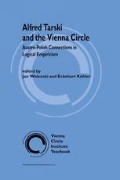Abstract
Hao Wang was born in 1921 in north-east China of a westernizing father; he came to study and teach at Harvard in 1949, and he remained in the West, always feeling culturally of two distinct worlds. His deep interest in Gödel as thinker and person indicates a Confucian influence, which holds the teacher to be the great authority in both administrative as well as family matters. Wang more than once combined scientific explication with biography, since in China a student must always show special respect and veneration for his teacher as a kind of father.
Access this chapter
Tax calculation will be finalised at checkout
Purchases are for personal use only
Preview
Unable to display preview. Download preview PDF.
Notes
Hao Wang,From Mathematics to Philosophy, Routledge and Kegan Paul, London 1974. A very knowledgeable analysis of Wang’s philosophy is provided by Charles Parsons, “Hao Wang as Philosopher”, in: Petr Hâjek (ed.),Gödel ‘86. Logical Foundations of Mathematics, Computer Science and Physics - Kurt Gödel’s Legacy(Lecture Notes in Logic 6 ), Berlin-Heidelberg-New York: Springer-Verlag 1996.
Hao Wang, Beyond Analytic Philosophy. Doing Justice to What We Know , Cambridge MA-London: The MIT Press 1986. The passage from Gödel’s Gibbs Lecture reproduced below is quoted here on p.324.
Hao Wang,Reflections on Kurt Gödel, Cambridge MA-London: The MIT Press 1987.
Heinrich Gomperz at Vienna was the teacher who most influenced Gödel’s Platonism. But even Gomperz felt rather close to the Vienna Circle. Gomperz’s father, Theodor, had been a renowned classical scholar at Vienna who attempted a strongly empiricist interpretation of all Greek philosophy.
. Kurt Gödel, “Some Basic Theorems on the Foundations of Mathematics and their Implications”, in: Kurt Gödel,Collected Works, Vol. III, ed. by Solomon Feferman et al., Oxford: Oxford University Press 1995.
Rudy Rucker,Infinity and the Mind. The Science and Philosophy of the Infinite, Basel: Birkhäuser 1982, p. 171.
Eckehart Köhler, “Gödels Platonismus”, in: Eckehart Köhler et al. (eds.),Kurt Gödel. Wahrheit and Beweisbarkeit, Vienna: Hölder-Pichler-Tempsky 1999. In 1986 Wang allowed me use of (copies of) his notes of discussions with Gödel, from which I profited a great deal.
Georg Kreisel, “A Notion of Mechanistic Theory”, in:Synthese 29 (1974), 11–26; Kreisel describes his conversation with Gödel about machines in “Kurt Gödel”, in: Biographical Memoirs of the Royal Society 26 (1980), 148–224.
Kurt Gödel, “Is Mathematics Syntax of Language?”, in: Kurt Gödel, Collected Works , Vol. III, op. cit.
Rudolf Carnap,Logische Syntax der Sprache , Vienna: Springer-Verlag 1934; translated as Logical Syntax of Language , London:Routledge and Kegan Paul 1937. Gödel was closely connected with this work, as the technique of arithmetization used in his incompleteness proof played an important role in the metalanguages of the Logische Syntax; and Gödel provided Carnap with advice on technical matters concerning the definition of mathematical validity attempted there.
Interestingly,Gödel several times associated Husserl’s program with Freud’s psychoanalysis, in particular by claiming that both dealt with the unconscious, the former through Wesensschau, the latter through analysis of dreams.
Herbert Spiegelberg,The Phenomenological Movement, The Hague: Martins Nijhof 1960, p.9. Spiegelberg emphasizes as a major `paradox“ of phenomenology that ”a philosophy so determined to make itself scientific and to encourage cooperative and progressive enterprise as in the other sciences failed in this attempt almost from the very start; that, in fact, the founder of this new movement found himself towards the end of his career in an almost tragic isolation, which he himself, with a kind of wry humor, compared to that of a solipsist… “ (p.88). Gödel was also strongly attracted to solipsism, culminating in the extreme statement that to ”know oneself was to know everything“.
Editor information
Editors and Affiliations
Rights and permissions
Copyright information
© 1999 Springer Science+Business Media Dordrecht
About this chapter
Cite this chapter
Köhler, E. (1999). Hao Wang, A Logical Journey. From Gödel to Philosophy, Cambridge, MA—London: The MIT Press 1996. In: Woleński, J., Köhler, E. (eds) Alfred Tarski and the Vienna Circle. Vienna Circle Institute Yearbook [1998], vol 6. Springer, Dordrecht. https://doi.org/10.1007/978-94-017-0689-6_25
Download citation
DOI: https://doi.org/10.1007/978-94-017-0689-6_25
Publisher Name: Springer, Dordrecht
Print ISBN: 978-90-481-5161-5
Online ISBN: 978-94-017-0689-6
eBook Packages: Springer Book Archive

